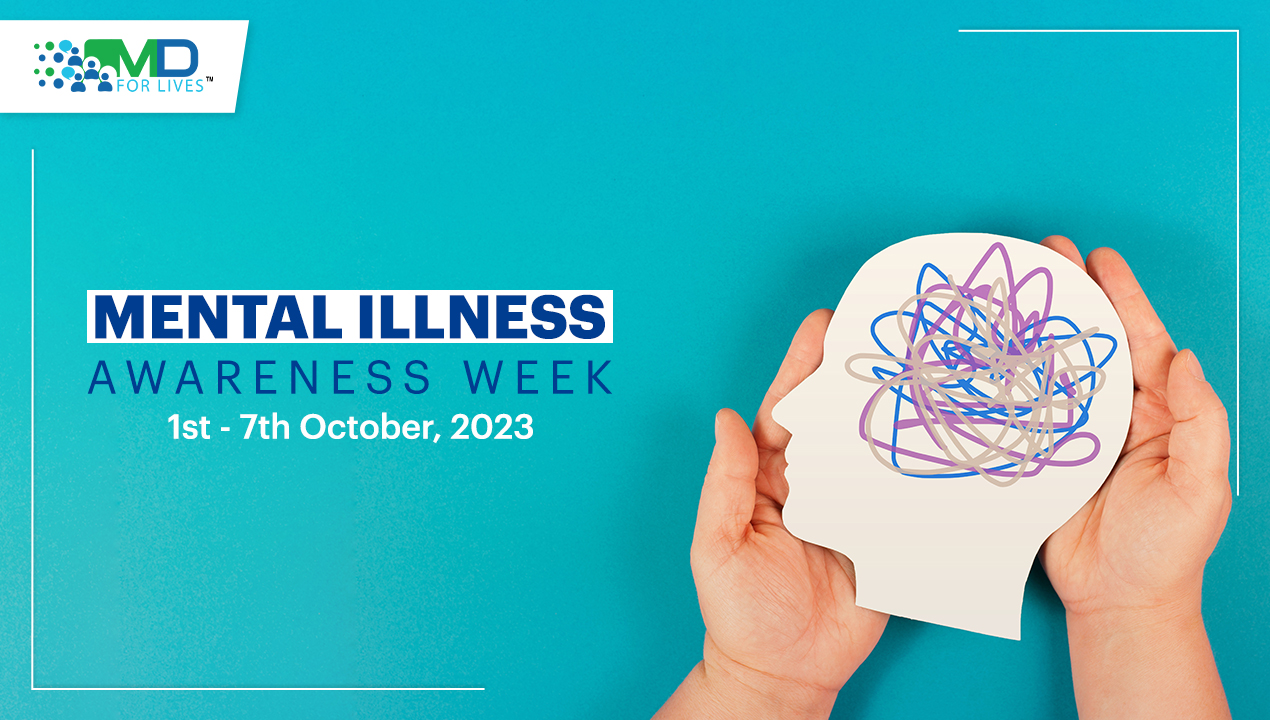In the field of healthcare and medicine, technical proficiency is undoubtedly essential. Medical schools prioritize the development of clinical skills and the acquisition of knowledge essential for the effective diagnosis and treatment of patients. However, there is a growing recognition that empathy, the ability to understand and share the feelings of another, is equally vital in the healthcare profession, particularly in the context of ‘Mental Health’ that has gained immense prominence in today’s era, especially after covid-19 swamped the world with a virus that was considered to be unbeatable back then. The reason why we specifically picked ‘Covid-19’ in this context is because the pandemic made us know or understand about the psychology of isolation, which definitely isn’t pleasant and has led to mental health issues be it depression, general anxiety disorder, panic attacks, etc.
Since we have stepped onto the Mental Illness Awareness Week, through this blog, we will explore the importance of teaching empathy in medical schools as a key component of mental health education.
Does ‘Empathy’ Really Play a Big Role?

Well, let’s be honest – empathy is not merely a desirable trait in healthcare professionals, it is an indispensable tool. Patients who feel understood and heard by their doctors tend to have better health outcomes, adhere to treatment plans more closely and experience reduced anxiety during medical visits.
To understand whether or not empathy plays a vital role, a group of researchers had done a study aimed at investigating the connection between physician empathy and clinical outcomes in diabetes patients; the findings revealed a significant correlation – patients under the care of physicians with high empathy scores displayed a notably higher rate of HbA1c control, with 56% achieving positive outcomes, in contrast to patients attended by physicians with low empathy scores, where only 40% achieved similar control.
Here are a few more reasons why physicians should wear their lab coats with pride and empathy with perfection:
- Breaking Down Stigma: – Mental health conditions have long been stigmatized in society, leading to avoidance or delayed seeking of treatment. Empathetic healthcare providers can help break down this stigma by creating a safe and nonjudgmental environment where patients feel comfortable discussing their mental health concerns openly.
Please note: Both the U.S. Surgeon General in 1999 and the World Health Organization (WHO) in 2001 have underscored the role of stigma as a significant barrier to successful treatment engagement, encompassing the initiation and continuation of participation in services. - Building Trust – Trust is the foundation of the doctor-patient relationship. When medical professionals demonstrate empathy, they establish trust with their patients. This trust is crucial in mental health, as it can encourage individuals to be honest about their symptoms, experiences and emotions.

- Enhancing Communication – Effective communication is a cornerstone of healthcare. Empathy improves communication by allowing doctors to connect with patients on an emotional level. This deeper connection facilitates more open and honest conversations, enabling healthcare providers to gather comprehensive information and make well-informed decisions. Moreover, understanding the placebo effect and its management can also play a vital role in effective patient care.Wondering what placebo effect is? Placebo effect is a psychological and physiological response that occurs when a person believes they are receiving a treatment or intervention that is expected to have a therapeutic effect, even though the treatment itself has no therapeutic or active ingredients. In other words, the placebo effect is a phenomenon where the belief in the effectiveness of a treatment or intervention can lead to real improvements in a person’s condition.
Teaching Empathy to Medical Students
Now that we understand the significance of empathy in mental health care, the question arises – “How can medical schools effectively teach empathy in patient care to the future healthcare providers?” Well, there are some strategies that medical schools may follow to foster empathy among its students who are about to be the frontliners in the medical sector.
To know those strategies, keep reading!
1. Role Modeling
Medical schools can begin by selecting instructors who exemplify empathy in their practice. Students often learn best through observation, so having empathetic role models can set a positive example.

2. Incorporating Empathy in Curriculum
Medical curriculums should incorporate empathy as a core competency. This involves teaching students how to recognize, understand and respond to the emotions and needs of their patients, especially in mental health contexts.
3. Real-World Clinical Exposure
Hands-on experience with patients is invaluable. Medical schools can provide opportunities for students to engage with patients, especially those with mental health concerns, under the guidance of experienced mentors.
4. Simulation Training
Simulated patient interactions can be an effective way of teaching empathy to medical students. These scenarios can be tailored to focus on mental health-related situations and challenges.

Here’s an example how wondrous Simulation Training is:
In a student-led educational initiative for third-year medical students of the University of Manchester Medical School, 8 students (four male and four female) participated in a two-hour workshop focusing on schizophrenia.
This workshop offered two distinct experiences: personal simulation and patient narratives, chosen to engage the students’ emotional understanding. Those 8 students were divided into two groups. The personal simulation session required them to listen to a recorded auditory hallucination for 15 minutes, designed to enhance empathy in patient care. In the patient narrative session, they listened to a patient’s journey through diagnosis and discussed their experiences.
Both of these approaches successfully reflected the power of simulation training to deepen empathy and understanding in medical education.
5. Reflective Practices
Encouraging students to reflect on their interactions and experiences can help them develop their empathy skills. Personal growth and self-awareness are essential components of becoming empathetic healthcare providers .
Conclusion: Empathy – The Cornerstone of Healthcare Education
With a clear understanding of the vital role played by ’empathy,’ it becomes imperative for medical schools to acknowledge and prioritize the integration of empathy into their educational programs. By nurturing empathy in the healthcare professionals of tomorrow, we have the power to mold a healthcare system that exudes compassion and understanding, ultimately leading to improved patient outcomes, particularly for those confronting mental health challenges. Empathy transcends theory – it is a dynamic practice capable of profoundly transforming lives and enhancing the overall quality of care in the medical profession.
MDForLives welcomes all physicians and allied healthcare professionals to join our community where we hold conversations like these, foster collaboration, exchange healthcare insights and connect with peers worldwide. Your valuable input in our surveys is deeply appreciated and in gratitude, you’ll receive a generous honorarium for your contributions.
References:
- Mental Health Stigma: Society, Individuals, and the Profession
Source: ncbi.nlm.nih - Teaching empathy to medical students
Source: ncbi.nlm.nih - Effectiveness of empathy in general practice: a systematic review
Source: ncbi.nlm.nih - The power of the placebo effect
Source: health.harvard.edu

MDForLives is a global healthcare intelligence platform where real-world perspectives are transformed into validated insights. We bring together diverse healthcare experiences to discover, share, and shape the future of healthcare through data-backed understanding.






